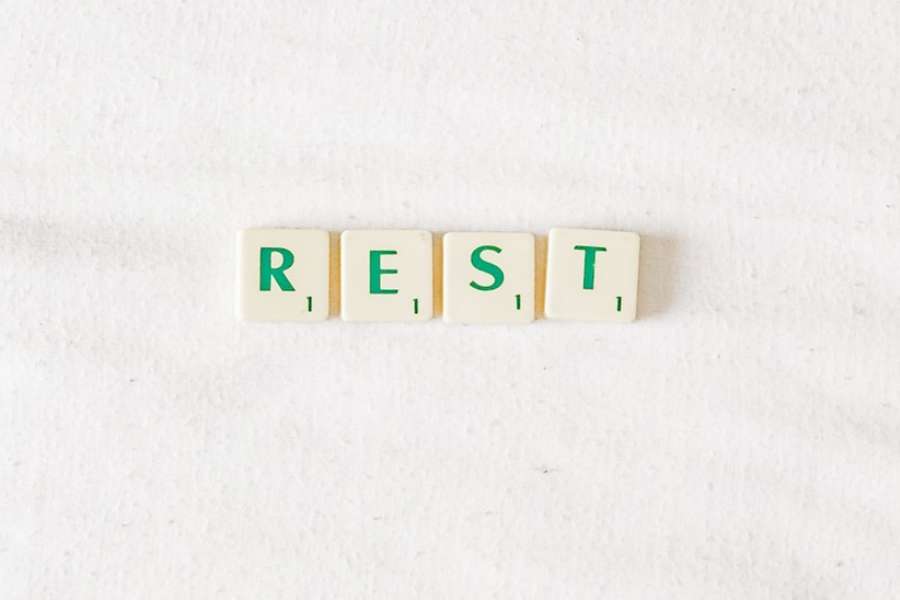1. Physical Rest
We are all familiar with physical rest and are generally good at it over the holidays! It’s giving your body a break from physical exertion, this can be achieved through activities like sleep, napping, or simply taking a moment to relax on the sofa. Adequate physical rest is crucial for repairing and rejuvenating your body, promoting muscle recovery, and overall reducing fatigue.

2. Mental Rest
The holidays usually mean you have just finished an exam period and are taking a break from the intellectual and cognitive tasks your course demands. Making this rest the one we relate to best, and the one we are eager to practice. Mental rest allows you to take a break, recharge and properly process information so your brain can unwind, reduce stress, and prevent burnout. You can achieve mental rest by focusing your full attention to activities, taking a few deep breaths, or engaging in hobbies that don't require intense mental concentration. The holidays provide a lot of opportunities for this.

3. Emotional Rest
Emotional rest is all about taking a step back from emotional turmoil and stress to maintain our emotional balance. Try not to think about the things that are waiting for you back at university, or the assignments you have completed, as you will start feeling guilty for taking this time away. Instead, allow yourself this time to do the things you have been putting aside for studies to look after yourself. Engage in activities that bring you joy and provide emotional nourishment, such as spending time with loved ones, journaling, or practicing self-compassion.

4. Sensory Rest
Most students are better at the first three restful acts, but now we get into the others that we may not realise we are lacking! Sensory rest is about reducing the sensory input you experience daily. The holidays are often filled with sensory overload, marketing plugs and overwhelm. Make conscious time to find quiet environments, minimise screen time, radio and music, and disconnect from the constant flow of information. Sensory rest helps your mind and body reset and rejuvenate.

5. Social Rest
The holidays bring people together, with work slowing down and more free time to celebrate. Social rest involves taking a break from social obligations and spending time alone. If you find large gatherings hard, don’t be afraid to take some time away for yourself. Solitude can offer a valuable opportunity to recharge your social batteries and regain emotional energy. Alternatively, spending the holidays by yourself can be equally draining and lonely. Social rest also involves being with a select few individuals who provide comfort and relaxation. Find a good balance!
6. Creative Rest
This rest is especially for those who engage in creative endeavours, whether as a hobby or your course. Don’t waste all your free time on your side projects or put pressure on yourself to brainstorm new solutions and get inspired for the new term. Creative rest involves stepping away from your projects and giving your mind the space, it needs to rejuvenate. It doesn’t necessarily mean you disregard consuming art that inspires you and brings you joy, but having the boundaries to compartmentalise your mindset that generates creative ideas and solutions, can lead to better innovation, and a fresh perspective when you return to it.

7. Spiritual Rest
Spiritual rest is often overlooked but equally important. It's about finding a sense of purpose and belonging. It is about knowing yourself and connecting with your values and priorities. Sometimes at university, we are heavily influenced and can lose touch with things that are important to us and our inner self. Use this time to reset and reconnect away from this environment. You can achieve this by engaging in practices such as meditation, spending time in nature, volunteering for a cause you care about, and speaking to a loved one. Spiritual rest helps you feel grounded and balanced.

Conclusion
The holidays can provide a large overload of information on top of the pressure to make it successful, and although we may be physically resting with a box of chocolates, we may not be recharging to our full potential. Recognising the importance of these seven types of rest is essential for maintaining a healthy, balanced life. Use this extra spare time to be intentional with your rest and nurture your well-being, and through this, you will be able to come back to university with a fresh perspective and an overall positive outlook with a productive outcome. So, take a break, relax, and stay in tune with the various types of rest that your body and mind needs to thrive.




